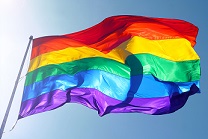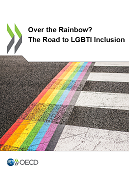Social and welfare issues
The OECD work on LGBTI+ inclusion
|
The OECD work on LGBTI+ inclusion was initiated based on a « Call to Action » signed in 2014 by 12 member countries (Australia, Chile, Denmark, Finland, France, Iceland, Ireland, Netherlands, Norway, Sweden, Switzerland, and the United States) asking the OECD to study the economic case for inclusive laws and policies for Lesbian, Gay, Bisexual, Transgender and Intersex (LGBTI) individuals. This project is now entering its third phase, following a roundtable organised by the Netherlands and the U.S. permanent Delegations to the OECD on the occasion of the 2021 International Day Against Homophobia, Transphobia and Biphobia (May 17, 2021) where member countries have renewed their commitment to achieve LGBTI+ equality. The OECD work on LGBTI+ inclusion is led by the Directorate for Employment, Labour and Social Affairs.
|
NEW in 2023
June 14th 2023: Release of policy brief on Fighting homophobia and transphobia in schools
May 11th: IDAHOT+ forum in Reykjavík, the main European yearly event where governments, intergovernmental organizations, civil society organizations and other key stakeholders meet to assess progress with respect to LGBTI+ rights in the continent
The OECD notably contributed to the discussion on addressing violence against LGBTI+ youth, at school and beyond.
Watch Marie-Anne Valfort’s talk on:
(1) promising practices to make schools a safer place for LGBTI+ pupils and students and
(2) priorities to protect LGBTI+ young people from hate crime and hate speech.
February: Launch of The Road to LGBTI+ Inclusion in Germany: Progress at the Federal and Länder Levels
This report is the first country review undertaken as part of the OECD work on LGBTI+ inclusion. It explores legal and policy progress towards LGBTI+ equality in Germany at both the national and subnational levels, and identifies good practices. The report first investigates the life situation of LGBTI+ Germans by presenting the most up-to-date data on the share of Germans who self-identify as LGBTI+, evaluating the extent to which LGBTI+ Germans face discrimination and violence, and assessing how this population fares in terms of well-being, mental and physical health. The report then examines whether laws critical to achieving LGBTI+ equality have been passed and how LGBTI+ equality in Germany could be further improved through legislation. Finally, beyond laws, the report focuses on policy achievements towards LGBTI+ equality, by distinguishing between remedial policies, aimed at enforcing antidiscrimination and anti-violence laws, and preventive policies, aimed at fostering a culture of equal treatment of LGBTI+ individuals at school, in the workplace, and in healthcare.
pride month 2022
Watch Marie-Anne Valfort's short interviews with Out@In, the LGBT+ employee resource group at LinkedIn:
- Are businesses doing enough to create LGBTI+-inclusive workplaces?
- Why should businesses become more LGBTI+-inclusive? Because this is a human rights imperative... but also because it makes a lot of economic sense!
- How could businesses become more LGBTI+-inclusive?
Did you know:
- In 2022 same-sex marriages are formally recognized in 24 OECD countries (or at least in some parts of their national territory) – in comparison to 1999 when no OECD country allowed same-sex partners to marry;
- On average across 17 OECD countries with available data, same-sex marriages represented 2.3% of all marriages in 2020, varying from 1.2% in Iceland to 3.7% in Australia;
- On average 57% of same-sex marriages were among women.
See more from OECD Family Database > Indicator SF3.1 on Marriages and Divorces (.pdf and/or .xlsx) > Table 1 on Basic statistics on same-sex marriages in OECD countries in 2020. [LinkedIn]
PHASE I AND PHASE II OF THE OECD WORK ON LGBTI+ INCLUSIOn
November 2021: TV interview of Marie-Anne Valfort in French on the main findings of the OECD work on LGBTI+ inclusion
June 2021: Beyond the Rainbow: Let’s make LGBTI+ equality a reality (Forum Network)
Phase II
|
|
February 2021: detailed presentation of the OECD report « Over the Rainbow ? The Road to LGBTI Inclusion » by Monika Queisser and Marie-Anne Valfort at the Harvard Kennedy School WAPPP Seminar (programme and replay)
The OECD report « Over the Rainbow ? The Road to LGBTI Inclusion » is also translated in:
|
Phase II of the OECD work on LGBTI+ inclusion focuses on the solutions to the challenges faced by LGBTI+ individuals. Its main output is the OECD report « Over the Rainbow ? The Road to LGBTI Inclusion » which identifies the laws that are essential to foster LGBTI+ equality, the extent to which these laws have been passed in OECD countries, as well as the policies that it is critical to implement, on top of passing LGBTI+-inclusive laws, to fully achieve LGBTI+ equality. This report notably unveils a positive relationship between legal LGBTI+ inclusivity and economic development: an increase in legal LGBTI+ inclusivity from its average value among the three lowest-performing OECD countries to its average value among the three highest-performing OECD countries is associated with an increase in real GDP per capita of approximately USD 3 200.
Phase II was funded by the United Kindgom, Norway, Canada and Austria.
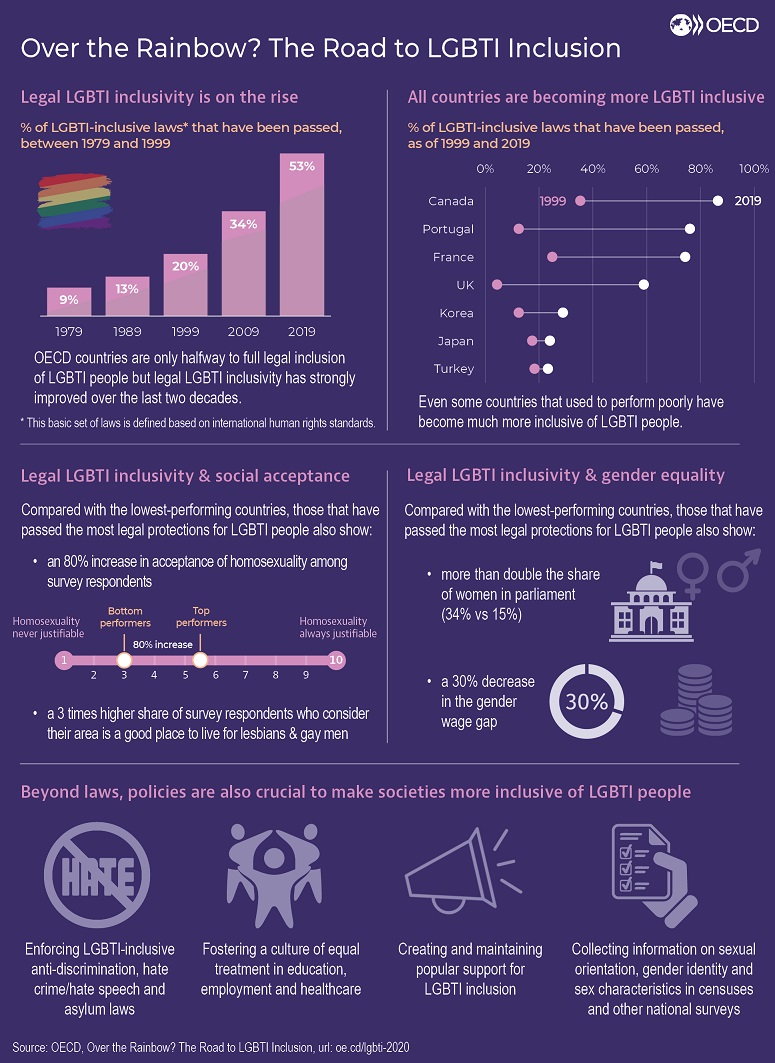
Phase I
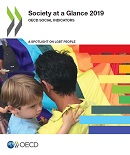 |
March 2019: Launch of Society at a Glance 2019, whose special chapter is devoted to The LGBT challenge: How to better include sexual and gender minorities? The special chapter is also translated in French : Le défi LGBT : comment améliorer l’intégration des minorités sexuelles et de genre ?
|
Phase I of the OECD work on LGBTI+ inclusion focuses on the challenges faced by LGBTI+ individuals. Its main output is the special chapter of the 2019 edition of the OECD flagship publication “Society at a Glance”. On top of showing that LGBTI+ people stand for a sizeable minority, this special chapter reveals that discrimination against LGBTI+ people continues to hamper the economic prospects and mental health of millions in OECD countries. This special chapter notably builds on:
- a comprehensive overview of data and evidence on the size, social acceptance and hurdles faced by LGBTI+ individuals: LGBTI in OECD Countries: A Review (Valfort, 2017 - OECD SEM Working Paper 198)
- highlights from the workshop on “Recent Advances in the Economics of Discrimination” that was organised on July 6-7, 2017 at the OECD Conference Centre : this workshop included a discussion of the OECD work on LGBTI+ inclusion by Nobel Prize Esther Duflo as well as a a session on anti-LGBTI+ discrimination with Christopher Carpenter (Vanderbilt University) and Erik Plug (University of Amsterdam).
Phase I was funded by the Netherlands, the United States, Denmark and Austria.
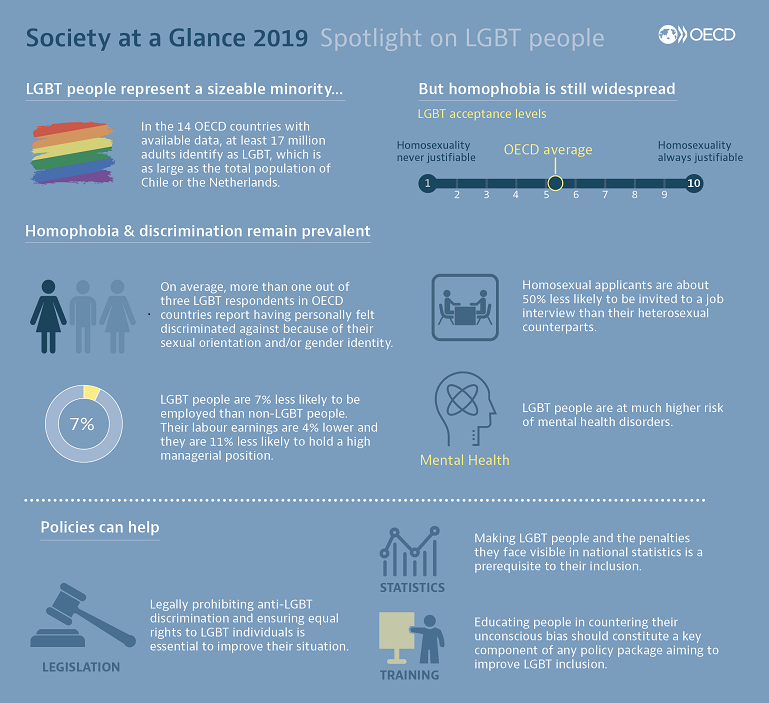
CONTACT
For more information, please contact: Marie-Anne.Valfort@oecd.org

Follow us on Twitter @OECD_Social
Related Documents
